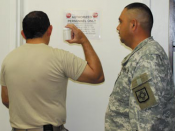Should defendants be forced to take a drug test? Are pretrial programs effective in reducing failure to appear rates and pretrial crime? Are pretrial drug-testing programs ineffective because they are based on faulty assumptions? These three questions need to be answered for one to fully understand pretrial drug testing programs, and whether defendants should be forced to take a drug test or not. This paper will explain this issue and why defendants should not be forced to take drug tests.
IneffectiveBased of Faulty AssumptionsRequiring pretrial drug testing has become a widely used practice; however, according to Neubauer, (2006) several studies find that at best pretrial drug testing programs have limited success. The reason for their limited success is that the programs are based on faulty assumptions, and are therefore ineffective. The first assumption is that pretrial drug testing programs reduce failure to appear rates, second is that they reduce pretrial misconduct.
Reducing pretrial misconduct. According to Henry and Clark, (1992), pretrial drug-testing programs are based on two assumptions. The first assumption is that obtaining the knowledge that a defendant uses drugs through a drug test at the time of his or her arrest allows for the prediction of pretrial misconduct. Second, monitoring defendants' pretrial drug use will reduce the risk of pretrial misconduct.
However, pretrial drug-testing programs do not help predict if a defendant will be rearrested while out on bail. According to Neubauer, (2006) the best "predictor" was the number of "prior arrests, and not drug use." For instance, repeat offenders who test negative for drug use are more likely to commit a crime while out on bail than a first-time offender who tested positive for drugs (Rhodes, Hyatt, and Scheiman, as cited in Neubauer, 2006).
According to Henry and Clark, (1992) "an experimental design was used to test...


